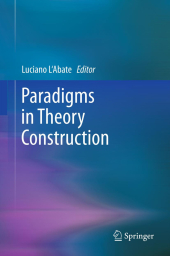 Neuerscheinungen 2014Stand: 2020-02-01 |
Schnellsuche
ISBN/Stichwort/Autor
|
Herderstraße 10
10625 Berlin
Tel.: 030 315 714 16
Fax 030 315 714 14
info@buchspektrum.de |

Luciano L´Abate
Paradigms in Theory Construction
Ed. by Luciano L´Abate
2014. xiv, 458 S. 235 mm
Verlag/Jahr: SPRINGER, BERLIN; SPRINGER NEW YORK 2014
ISBN: 1-489-99959-0 (1489999590)
Neue ISBN: 978-1-489-99959-7 (9781489999597)
Preis und Lieferzeit: Bitte klicken
The paradigm is a core concept in our understanding of scientific progress. Merging the philosophy of science with the history of scientific enquiry this book traces the development of theories and paradigms in psychology, ´hard´, and social sciences.
Within the field of psychology there is a proliferation of paradigms, theories, models, and dimensions without an underlying conceptual framework or theory. This conclusion has been reached by representatives of many different psychological specialties.
In response to this inconsistency this book presents a hierarchical framework about important theoretical issues that are present in psychological thinking. These issues concern definitions of three major theoretical concepts in theory and practice: (a) paradigms, (b) theories, and (c) models. It focuses on defining, comparing, and contrasting these three conceptual terms.
This framework clarifies differences among paradigms, theories, and models, terms which have become increasingly confused in the psychological literature. Paradigms are usually confused with theories or with models while theories are confused with models. Examples of misuses of these terms suggest the need for a hierarchical structure that views paradigms as conceptual constructions overseeing a variety of psychological theories and verifiable models.
Paradigms in Science and Theory Construction.- Paradigms in Science: A Historical Perspective.- Evolving Paradigms: Retrospective and Prospection.- Anthropology.- Parallel Paradigms of Artists and Authors.- Economics.- Education.- Sociology.- The Biopsychosocial Paradigm.- Interbehaviorism.- Reflections on Personality Systematics and an Unified Clinical Science.- The Intersubjective-narrative Approach versus the Relational-generational one.- Constructivism.- Materialism.- Explicating and Exemplifying Empicist and Cognitivist Paradigms in the study of Human Learning.- Humanism and Behaviorism.- Existentialism.- Information Processing.- Reductionism.- Produced and Spontaneous Emergent Interactionism.- The Emergence of Reason, Intelligence, and Language in Humans and Animals.- Essentialism.- Criteria and Processes in Paradigm Selection.


